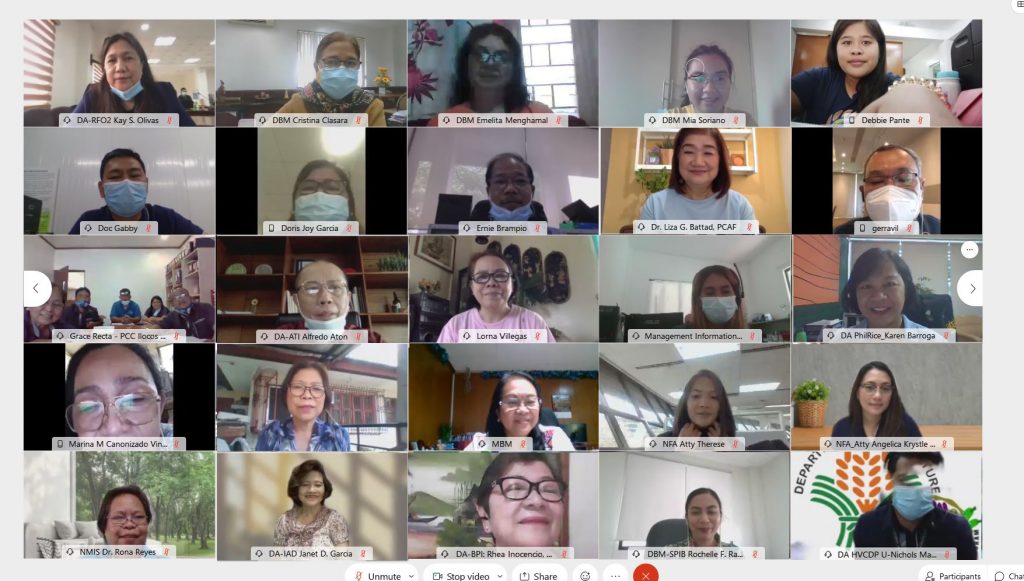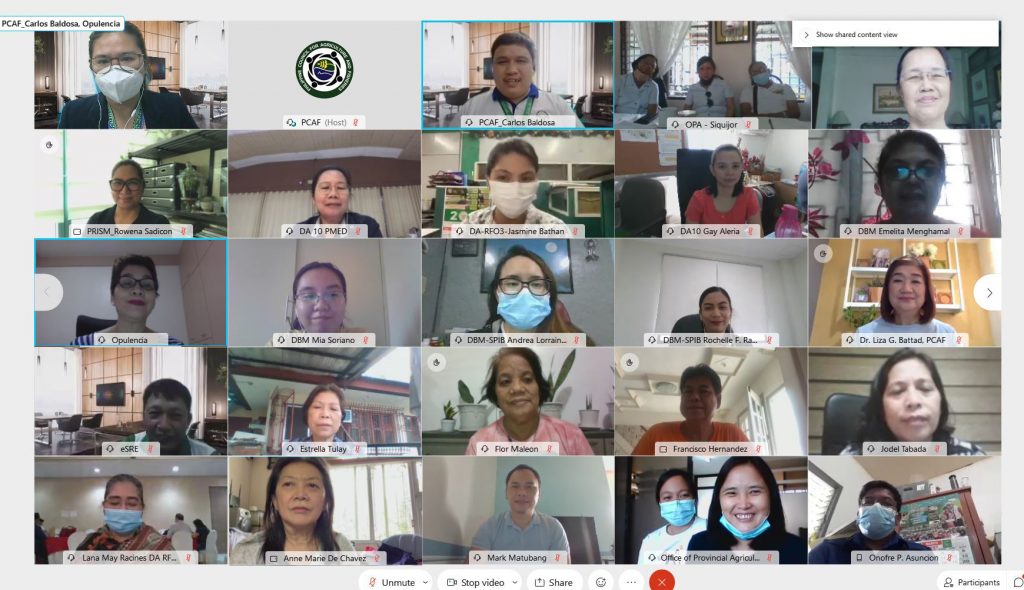In preparation for the full devolution of Mandanas-Garcia ruling in 2022, the Department of Budget and Management (DBM), through the Philippine Council for Agriculture and Fisheries’ (PCAF) knowledge-sharing activity, clarified concerns on the prioritization of the agri-fishery sector, discontinued projects and programs, and affected employees.
The two-part online session was joined by more than 300 participants from the Department of Agriculture (DA) Central Office, DA bureaus and attached agencies, PCAF, national and regional Agricultural and Fishery Councils, and other private sectors on March 23, 2021.
Chief of Budget and Management Specialist and Systems and Productivity Improvement Bureau (SPIB) Rochelle Ramirez presented the salient features and impact of the Mandanas-Garcia ruling on the agri-fishery sector and the various efforts carried out to ensure that the Local Government Units (LGUs) are ready once it is in force.
One of the concerns during the event is the notion that the National Government Agencies (NGAs) might lose their set duties and responsibilities.
The team from DBM clarified that the NGAs will only devolve certain functions to the LGUs which will further empower them. The NGAs will also assist the LGUs in the transition of devolving these functions before completely handing over these functions to the LGUs.
“The role of the agencies in these devolved functions and services, in general, is to steer. This also includes crafting or development of service delivery standards on how the LGUs should implement or regulate these functions. NGAs’ roles also include monitoring, evaluation, and performance assessment of the LGUs,” said Ramirez.
SPIB OIC Director Emelita Menghamal also said that one of the concerns before in the devolution under the Local Government Code (LGC) is that devolved functions don’t include financial as well as the human resources.
“This time, LGUs are being provided with funds. The devolved functions will come with an increased Internal Revenue Allotment (IRA) share,” she said.
Another concern raised during the event is the inequality of funds due to different income classes. According to DBM, a Growth Equalization Fund shall be established starting Fiscal Year (FY) 2022 to address the problem of marginalization, unequal development, and high poverty incidence across different LGUs.
The employees from NGAs that will be affected by the devolution will have multiple options such as transfer to other units within the agency, transfer to other agencies within the executive branch, or retire/separate from service, and be given preference to vacant positions in LGUs.
The ruling will also devolve the basic services and facilities to LGUs in accordance with Section 17 of the LGC. These services include agricultural extension and on-site research, community-based forestry projects, tourism facilities, promotion, and development, telecommunication services, field health and hospital services, public works and infrastructure, housing projects for provinces and cities, Investment support, industrial research and development, school building program, and social welfare services.
The Mandanas-Garcia Cases resulted from the petition of Batangas Governor Hermilando Mandanas and former Bataan Governor Enrique Garcia, Jr. in the Supreme Court in 2018 and was reaffirmed in 2019.
The Supreme Court ruling states that the “just” share of the LGUs from national taxes is not limited to national internal revenue taxes collected by the Bureau of Internal Revenue but also includes collections from customs duties by the Bureau of Customs, which in turn will result into a PhP234.6Billion expected increase in the National Tax Allotment of LGUs by FY 2022 based on the computations by the Department of Finance.
“The Supreme Court Ruling on the Mandanas-Garcia Cases basically modified the basis of the gesture of the LGUs from the national taxes, merely national internal revenue taxes before, now it will cover all national taxes,” said Ramirez.
Ramirez and SPID OIC-Director Menghamal were also joined by pool of experts from the DBM led by Undersecretary Laura Pascua, Budget and Management Bureau (BMB) Director Cristina Clasara, and BMB’s Mary Ann Ricohermoso in the open forum which ensured that all questions from the participants were addressed.
In 2019, an Executive Order (EO) was formulated in line with the full devolution. Last year, preparation of devolution transition plans was made and service standards for devolved functions and services were defined.
The capacity development strategy of LGUs and strategic communications plan were also formulated and various consultation meetings were upheld. The planning-budgeting linkage was also strengthened and the EO on full devolution was refined and was submitted to the Office of the President.
This year, the submission of transition plans of NGAs and LGUs, implementation of communication plans, development of framework for performance assessment of devolved functions, strengthening of capacities of NGAs on monitoring and coaching functions, and capacity building activities for LGUs are expected to be rolled out before the implementation of the ruling in 2022 where the concerned parties will closely monitor the devolution process.###CCB













